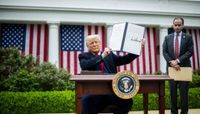Buffalo, New York - On April 3, 2025, approximately 200 Americans braved the cold to rally in Buffalo, New York, near the Canadian border, voicing their solidarity with Canadians facing the new import tariffs announced by President Donald Trump. The protesters expressed their discontent with the recently proposed tariffs on Chinese goods, fearing that such measures would escalate global trade tensions, increase inflation, and hinder economic growth in both the U.S. and worldwide.
Trump’s administration has taken a hardline stance on trade, announcing a 10% tax on all imports and additional tariffs on Chinese goods. The president's rationale for these tariffs is to level the playing field, ensuring that U.S. products can compete effectively against foreign goods. However, many Americans, including those in Buffalo, are concerned about the potential repercussions of such aggressive trade policies.
According to local protester Mary Johnson, "We’re here to show that we stand with our neighbors to the north. These tariffs will hurt everyday people, not just big corporations." The sentiment at the rally echoed a broader anxiety among consumers and businesses alike, who worry that rising costs will lead to higher prices on everything from bicycles to wine.
Meanwhile, Canadian Prime Minister Mark Carney has vowed to retaliate against the U.S. tariffs, particularly the 25% tax imposed on all imported vehicles. Carney emphasized the importance of unity and decisive action, stating, "In times of crisis, it is crucial to come together and act purposefully and strongly." He plans to discuss countermeasures with provincial leaders and is expected to announce specific strategies to support Canadian workers affected by the tariffs.
Carney’s government is particularly concerned about the impact on strategic industries such as pharmaceuticals, lumber, and semiconductors, which could face significant challenges if U.S. tariffs continue to escalate. "We will fight against these tariffs with countermeasures. We will protect our workers and build the strongest economy in the G7," Carney added during a press conference.
In response to the U.S. announcement, global reactions have been swift and varied. China has called for the immediate repeal of the new tariffs, with the Ministry of Commerce criticizing the Trump administration for ignoring the successes achieved through multilateral trade negotiations. "China firmly opposes these measures and will use countermeasures to protect its rights," the ministry stated.
Japan’s Minister of Trade, Yoshi Muto, expressed disappointment over the tariffs, labeling them as "extremely regrettable." Muto indicated that Japan would seek exemptions from Washington, as the country currently faces a 24% retaliatory tariff. South Korea's acting President Han Duck-soo ordered emergency support measures for businesses affected by the tariffs, particularly in the automotive sector.
While Canada and Mexico are already subject to a 25% tariff on certain goods, Carney confirmed that these measures would remain in effect, complicating the trade landscape further. "We are prepared to respond aggressively to these tariffs," he reiterated.
In the European Union, Bernd Lange, chair of the International Trade Committee in the European Parliament, stated that the EU would respond with "appropriate, fair, proportionate, and decisive measures." He expressed hope that a strong EU reaction would prompt the U.S. to return to the negotiating table. Similarly, Simon Harris, Ireland’s Minister of Trade, affirmed that the EU would protect its citizens, workers, and businesses from the fallout of U.S. tariffs.
Brazil, the largest economy in Latin America, is also considering its options in light of the U.S. tariffs. The Brazilian government stated it is reviewing all possible actions to ensure fairness in bilateral trade, including filing complaints with the World Trade Organization (WTO). On the same day, Brazil’s Congress passed a bill establishing a legal framework that would allow the country to implement retaliatory measures, including tariffs against U.S. goods.
As the world grapples with the implications of these new tariffs, economic analysts warn that the potential for a trade war could lead to significant disruptions in global markets. Many fear that the rising costs associated with tariffs will not only affect trade relationships but also lead to increased prices for consumers.
In Buffalo, the rally served as a reminder of the real-world consequences of trade policy. Local businesses are already feeling the strain, with some owners expressing worry that increased tariffs could lead to layoffs and reduced consumer spending. "We’re all connected in this global economy," said local business owner Tom Richards. "When one country raises tariffs, it affects us all."
As the situation continues to develop, the focus remains on how both the U.S. and its trading partners will navigate this turbulent period. With calls for negotiations and countermeasures echoing from various countries, the path forward remains uncertain, leaving many to wonder what the long-term impacts will be on the global economy.
In the coming days, as leaders from Canada, Japan, and other nations convene to discuss their responses, the international community watches closely. The stakes are high, and the outcome of these discussions could shape the future of global trade for years to come.








